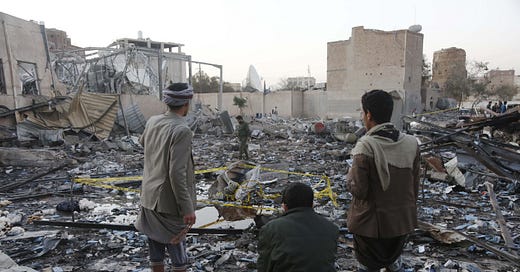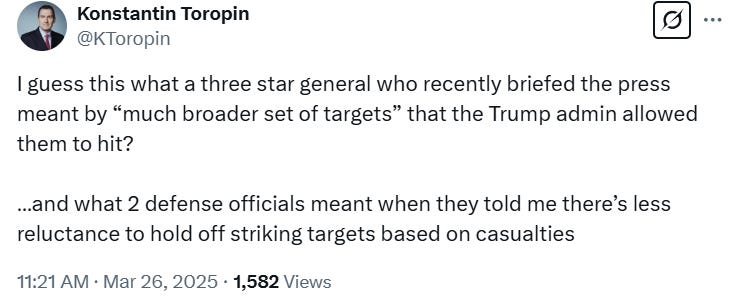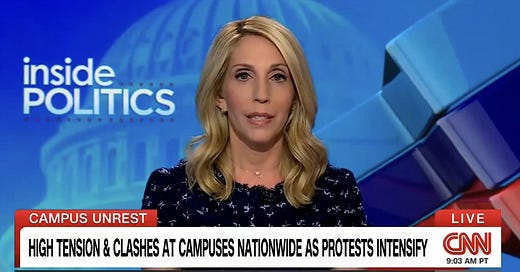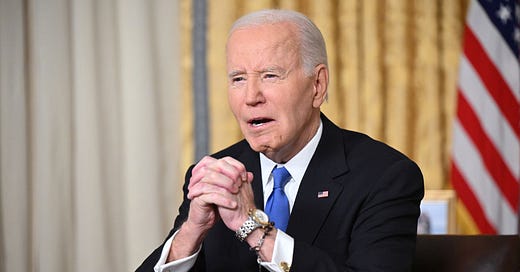
The Horror at the Heart of the 'Houthi PC Small Group' Airstrikes
'SignalGate' is funny. But it's also an example of one of Trump's worst policies.
In the beginning of 2019, the first Trump administration made a small, little-noticed change to an internal military policy.
At the time, the Department of Defense was somewhat-reliably tracking most of its activities in at least a few of the conflicts its assets were deployed in, and, if you were on the right mailing list, it was possible as a journalist to get a regular readout of approximately when, where, and why (sorta), America’s joint task force in Iraq and Syria was dropping munitions and carrying out strikes. These reports, since 2014, had come out weekly, and while they were far from a comprehensive record of America’s lethal engagements abroad, they were a whole lot better than nothing.
In January of 2019, though, they dropped to every two weeks. Eventually, the location data was removed — the strikes were logged, but where they had fallen was omitted, making them generally meaningless. Then, in March of 2019, the Trump administration quietly did away with a reporting requirement that forced other government agencies — namely, the CIA — to report their activities in the same way the DoD did, while also pushing for more of its offensive operations be carried out by clandestine assets and not by the DoD, which still had some reporting requirements.
If you’re still with me, you probably have an idea of what this all adds up to: while the Obama-era drone wars weren’t great, they were a drop in the bucket compared to what Donald Trump made possible. And he’s doing it all over again.
Amidst the fallout of “SignalGate,” which Rafi covered well yesterday, is a tidbit that stopped me in my tracks. Setting aside the fact that we may not have known about these strikes at all if not for The Atlantic’s Jeffery Goldberg being mistakenly put in the groupchat, the specific details of Pete Hegseth’s barroom strike package are shocking. As military.com reporter Konstantin Toropin noticed, Hegseth claimed that the drone strikes targeting an alleged Yemeni terrorist leader collapsed an entire apartment building that the drones observed him entering. In other words, the United States wiped out an entire residential structure in order to kill one target.
Yes, the U.S. has done that before, many times. But a point I’ve been yelling about for years is that there is a slim but vital distinction between overseas activities with even a veneer of oversight and accountability and what the Trump organization clearly feels empowered to do, which is impose a limitless amount of collateral damage in order to prosecute its shoddily-planned operations anywhere in the world.
Sure, it’s not like anyone running the U.S. imperial apparatus was ever going to face punishment for their crimes, but the existence of reporting mandates and at least some public or international accountability for overt war crimes gave the midlevel commanders — and occasionally even the appointed officials — carrying out these orders gives the potential for some kind of deterrent for wanton slaughter. These were crumbs, of course, but in the constant brutality of war, any shred of decency you can force men to abide by matters. Under Donald Trump, it’s clear we won’t get any of those. This is Toropin’s follow-up reporting:
It’s easy, I know, to lump the American Empire’s broad and exhaustive list of crimes against humanity together. It’s easy to say that this is the same as it ever was, that no one will ever pay for their sins, that we will continue killing no matter what legal guardrails and meager public oversight our government allows. That’s true for the most part.
But I think what that misses is that each missile launch or fired bullet is the product of individual moral decisions being made by many people. There are an enormous amount of people involved in every step of deciding whether or not to drop a million-dollar missile on a farmer’s head, and even if the final executioner’s order comes directly from the White House, these little nuances of process and accountability do, in some ways, slightly increase the chance that someone, along the way, will decide that this particular strike is unjust, or too risky.
The world that the Trump administration is creating is one in which none of that exists: where the pathway between targeting and killing is as short and smooth as possible, and the decision to pull a trigger is one that eventually becomes no problem at all. It is going to become so easy. In Pete Hegseth’s military, we already know that all it takes is firing off a text.



















Also note that the purpose of the bombing seems to be protecting European shipping. By going after the Houthis who put actions behind their words to try to stop the slaughter in Gaza, the Europeans won't be as inclined to pressure Israel to stop the slaughter if they're not paying a price.
i’m confused. if you saw my earlier, deleted, post you know that already. did goldberg only publish after they discovered he was in they’re chat? if not, why didn’t he just stay in that chat and start reporting things out anonymously? maybe they would have figured out where the info was coming from right away but you never know with these dipshits. he could have just stayed in that chat forever and had a front row seat to all of these internal workings. unless the chat was dedicated to that one strike, and then was abandoned. then disregard everything i’m saying.